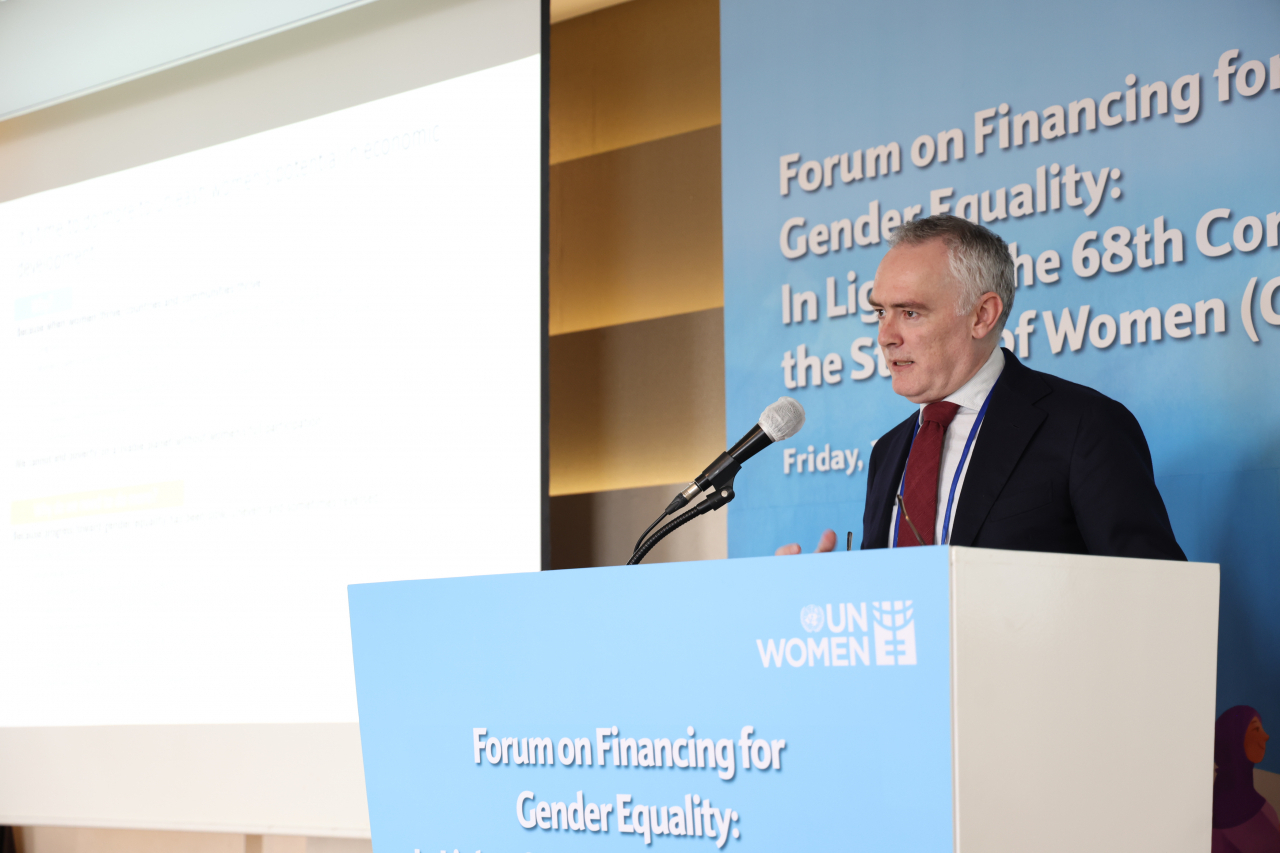Financing with gender perspective pivotal for equal, just society: UN
By Choi Jeong-yoonPublished : May 6, 2024 - 11:15

Despite notable progress in the recognition of gender equality, women continue to face numerous socioeconomic disparities, including limited access to education, health care and economic opportunities across the world.
Such discrimination leads to women suffering higher chances of danger and poverty. Combined with fewer resources and less power, women become the first victims and the last to recover, noted the UN Women Center of Excellence for Gender Equality.
To put an end to the vicious cycle, strengthening relevant institutions and financing with a gender perspective is pivotal, said Zohra Khan, senior policy adviser of the UN Women Headquarters, at a forum held in Seoul where experts discussed strategies to implement the agreed conclusions of the recent 68th Commission on the Status of Women.
The UN’s largest annual gathering on gender equality and women’s empowerment, this year’s CSW has drawn out resolutions to integrate a gender perspective into financing, expand fiscal investment to end poverty for women and girls and engage and finance women’s organizations and collectives.
Some 10 percent of women worldwide endure extreme poverty, highlighting a stark imbalance compared to their male counterparts, data from UN Women showed. Women aged 25 to 34 are 1.2 times more prone to extreme poverty than men within the same age group. This inequality extends into later stages of life, with statistics indicating that 8 percent of women aged 55 to 59 live in extreme poverty, compared to 6.9 percent of men in the same age bracket.
The reality, however, is that countries struggle to raise adequate financing to tackle the discrepancies due to high debt and the lack of recognition and consensus of the need to address the societal issues, experts at the forum pointed out.
"Currently, 48 countries, home to 3.3 billion people, are directly affected by underinvestment in education or health due to large debt interest payment burdens," said Khan. Failing to generate sufficient domestic revenue via taxation, countries have been compelled to slash official development assistance earmarked for promoting gender equality.
In the case of countries engulfed in economic and political crises, the situation worsens. In Myanmar, women and girls are disproportionately impacted by the military takeover in 2021, seeing a fivefold increase in politically motivated abuse against women since the coup.
Despite the great danger women face in Myanmar, the current support fund and system lag far behind, noted Sarah Knibbs, deputy regional director at UN Women Asia and the Pacific and country representative of Myanmar. "Only 0.68 percent of the official development assistance goes to women’s rights organizations in Myanmar," she added.
To provide adequate funding for women in danger lies in investing in organizations that work with women at the grassroots and community level in Myanmar to reach marginalized women at the lowest bottom of society, Knibbs emphasized.
"Before the military takeover, we were able to work with the government to provide technical support to different aspects of gender policy development. During the crisis, as we stand, we focus our work on women's organizations," said Knibbs.
Expanding the support to women-supporting organizations in the country after the takeover, Myanmar's headquarters supported almost 400 organizations and directly benefited more than 54,000 people, manifesting a clear result in aiding women in need.
Financing and supporting women is not just for women, but is a path to the ultimate eradication of poverty and sustainable development, according to Jason Allford, special representative to Korea of World Bank Group.
“When women thrive, countries and communities thrive,” said Allford, adding that long-run income per capita would be around 20 percent higher if women were employed at the same rate as men, while gross domestic product would increase as well.
“If gender economic activity in Korea was to become equal, the growth rate would increase by 1 percent and GDP by 10 percent.”
Experts at the forum called for the achievement of gender equality and the empowerment of all women and girls through strengthening institutions and financing with a gender perspective to accomplish sustainable development and promote just and inclusive societies.


















![[Herald Interview] Byun Yo-han's 'unlikable' character is result of calculated acting](http://res.heraldm.com/phpwas/restmb_idxmake.php?idx=652&simg=/content/image/2024/05/16/20240516050855_0.jpg&u=)
